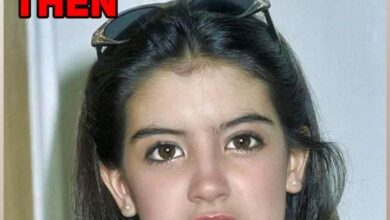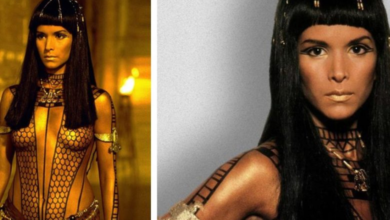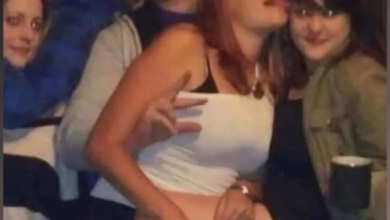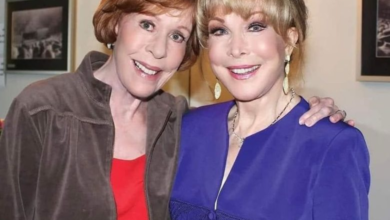Waitress Told Me and My Grandson to Leave the Café – Moments Later Our Lives Were Transformed

They told us we didn’t belong there. One moment, my grandson was laughing through a mouthful of whipped cream. The next, a stranger muttered under his breath, and a waitress quietly asked us to leave the café. I thought it was simple cruelty — until Ben pointed at her face… and everything I believed about our lives shifted forever.
My daughter and her husband had spent nearly ten years trying to have a baby. There were doctors, treatments, pills, and tears — the kind of waiting that makes the air in a home heavy, like even hope has gone silent.
Some evenings, I’d watch her sitting by the window, her hands clasped in her lap, eyes somewhere far away. She didn’t cry anymore. She just existed in that stillness, as if she’d stopped believing something beautiful could happen.
Then, one night, the phone rang. Her voice on the other end trembled between joy and disbelief.
“Mom,” she whispered, “we’re adopting.”
The dish I was washing slipped from my hands and shattered in the sink. I didn’t even notice the water still running as I sat down, shaking.
We were terrified — all the what-ifs swirling in our minds. But the second little Ben came into our lives, all that fear dissolved. He was tiny, with serious brown eyes that seemed far older than his years. When they placed him in my arms, he didn’t cry. He just looked up at me, then wrapped his fingers around mine like he already knew I was his.
That was the moment our story began — not through blood, but through something deeper. Something chosen.
Four years later, tragedy struck. My daughter and her husband were gone — taken in an instant by a truck that ran a red light. One phone call in the night, and everything changed.
And just like that, at sixty-four, I became a mother again.
Grief carves strange shapes inside you. It makes you brittle in some places and stronger in others. My joints ache, my hands tremble when I knit too long, and some mornings I can barely stand. But I keep going. Because Ben needs me. And that’s enough.
I sell flowers and vegetables at the farmers market — tulips in spring, tomatoes in summer. At night, I knit scarves and mittens when my hands allow. We don’t have much, but our little home is full of warmth and love.
That morning, Ben had a dentist appointment. He gripped my hand the whole time, brave but tense.
“You okay, sweetheart?” I asked.
He nodded, quiet as always.
Afterward, I told him I had a surprise. His eyes lit up.
“Hot chocolate?” he asked softly, as if he wasn’t sure he deserved it.
I smiled. “You earned it.”
We walked to a new café — sleek, modern, full of people tapping on laptops. We didn’t quite fit in, but I figured if we sat quietly, no one would mind.
Ben chose a window seat. His curls were full of static, and he giggled when they stuck to his face. The waitress brought a steaming mug piled high with whipped cream. He took a sip, leaving a snowy mustache, and laughed when I dabbed it away.
Then came the sound — a sharp click of disapproval.
“Can’t you control him?” a man muttered, not even looking up.
His companion said softly, “Some people just don’t belong in places like this.”
Heat rushed to my cheeks. Ben’s shoulders slumped.
“Did we do something bad?” he whispered.
I forced a smile. “No, baby. Some people just forget how to be kind.”
I thought that would be the end of it. But soon, the waitress returned.
“Ma’am,” she began gently, “you might be more comfortable outside. There’s a bench across the street.”
Her tone was polite, almost apologetic — but the message was unmistakable. We weren’t welcome.
I looked at Ben, whose lip was trembling. “Come on, sweetheart,” I murmured, reaching for his hand.
But he didn’t move. “Grandma,” he whispered, “we can’t go.”
“Why not, honey?”
He didn’t answer. He just stared past me.
I turned — and saw him looking at the waitress. Not at her uniform, not her hair — but her face.
“She has the same spot,” he said softly, pointing to his cheek.
I frowned. “What spot?”
He tapped just below his eye. “The little brown dot. Like mine.”
I looked closer. And there it was — a small birthmark on her left cheekbone, identical in shape and color to Ben’s. My chest tightened. Her eyes, the curve of her mouth, even the way she frowned — echoes of him.
I tried to ignore it, but my heart wouldn’t slow down.
When she came back with the check, I managed a polite smile. “Sorry if we disturbed anyone. My grandson just noticed your birthmark — it caught his attention.”
Her eyes flicked to Ben. For a moment, her expression faltered — surprise, maybe recognition. Then she turned away, silent.
Outside, the air was sharp and cold. I was helping Ben with his coat when I heard someone behind me.
“Ma’am,” she called softly.
It was her — the waitress. Her hands trembled slightly as she approached. “Could I talk to you? Just for a minute?”
Something in her voice made my stomach twist. I told Ben to stay nearby, and followed her a few steps away.
“I’m so sorry,” she said. “For what happened inside. It wasn’t fair.”
I nodded, wary. “It’s all right.”
“No, it’s not,” she said quickly. “But that’s not why I came out here.” Her breath hitched. “I need to ask you something. Is he… your biological grandson?”
The question caught me off guard. I hesitated, then said quietly, “No. My daughter adopted him five years ago. She and her husband passed away last year.”
Her eyes glistened. She clutched her apron like she needed it to steady herself.
“His birthday — is it September 11th?”
I froze. “Yes,” I whispered.
Her face crumpled. “I had a baby that day. A boy. I was nineteen. I didn’t have anyone, no money, no help. I gave him up for adoption, and I’ve regretted it every day since.”
Tears welled in my eyes. I didn’t know how to breathe.
“I’m not asking for anything,” she said. “I just… when I saw him, I felt something. And when he pointed out that mark… I knew. I just had to ask.”
I reached for her trembling hand. “Ben needs love — and people who won’t disappear. If you want to be part of his life, we can figure that out. But only if you’re ready.”
She nodded, crying openly now. “Can we go back inside? I want to make it right.”
When we reentered the café, the same customers stared. But Tina — that was her name, I noticed now — stood tall and said clearly, “For anyone wondering, this café doesn’t tolerate hate. If that’s a problem, you’re free to leave.”
The room went silent.
Ben’s little shoulders relaxed. He grinned and squeezed my hand.
From then on, we came every week. Tina always saved a table for us. She’d bring extra whipped cream and listen to Ben’s stories about superheroes and dragons. He’d draw her pictures and beam when she hung them by the register.
Sometimes, she visited our home — bringing muffins, secondhand books, and small toys. With every visit, Ben’s laughter grew louder, fuller.
Then one quiet evening, as I folded laundry, he appeared in the doorway.
“Grandma,” he said, “is Tina my real mom?”
My hands froze around a tiny sock. “Why do you think that, sweetheart?”
“She looks like me,” he said simply. “And she makes me feel safe.”
I took a deep breath. “And if I told you yes?”
He smiled softly. “Then I’d be really happy.”
The next day, I told Tina everything. We both cried. And when we told Ben, he just nodded, as if he’d known all along.
Later that week, at the café, Tina came out carrying his drink. Ben jumped from his seat, ran into her arms, and whispered, “Hi, Mom.”
She sank to her knees, holding him tight. Tears streamed down her face — not from sorrow this time, but from peace.
I still miss my daughter every day. I always will. But I know this — she’d want Ben to have all the love the world could give him. And now, he does.
Sometimes life breaks you open just to put you back together in a way that makes more sense. You just have to be willing to look twice — even at the person who once asked you to leave.



